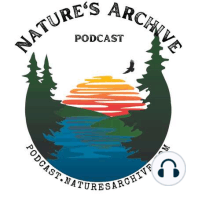65 min listen

#16: Tora Rocha and Terry Smith - The Pollinator Posse Part 2 - What Landowners Can Do to Create Habitat
FromNature's Archive
#16: Tora Rocha and Terry Smith - The Pollinator Posse Part 2 - What Landowners Can Do to Create Habitat
FromNature's Archive
ratings:
Length:
31 minutes
Released:
Mar 9, 2021
Format:
Podcast episode
Description
Today’s guests are Tora Rocha and Terry Smith, founders of the Oakland, California based Pollinator Posse. The Pollinator Posse creates pollinator-friendly landscaping and fosters appreciation of local ecosystems through outreach, education and direct action. They engage with municipalities, land owners, golf courses, garden groups, and the general public to help people become better stewards of the land.In Part 1 we discussed Tora and Terry’s background and what the Pollinator Posse does. We also got deep into the frightening collapse of the Western Monarch Butterfly population, including a lot of background on Monarch’s life history and what people across the USA can do to support these charismatic creatures. So, if you’re interested in creative ways to engage the public to take better care of the land, or want to learn more about Monarch Butterflies, be sure to go back and give it a listen.In Part 2, we get deeper into what homeowners and landowners can do to support their habitats. This is a critical and undervalued part of conservation efforts. Pollinators and insects in general are foundational to the health of our ecocystems, whether for their services pollinating fruits and vegetables, or as a foundational food source for animals higher up the food chain. From an ecosystem perspective, all of our properties are connected. Consider how easily insects, birds, squirrels, and other animals travel from yard to yard. With that in mind, just one yard unknowingly contaminated with systemic pesticides can result in an outsized blast radius.I was surprised to learn from Tora and Terry that most plants purchased from the big box stores are pre-treated with systemic pesticides called neonicotinoids, and these have long term devastating effects. They offer tips on avoiding these pesticides. We also discuss BT plants, the impact of fungicides, and more.They also discuss easy steps to add habitat to your yard - and the good news is much of the approach is to just be lazy! I think you’ll be excited to hear what they have to say.You can find out more at pollinatorposse.org or their Facebook group. People and OrganizationsArt Shapiro - University of California Davis Professor with longest continuously monitored study sites. See Art's work here. This Bay Nature article discusses Shapiro's work and the insect apocalypse.Journey North - a 25 year citizen science program tracking migrations, now associated with the University of Wisconsin-Madison ArboretumKaren Overhauser - Professor and Director of the University of Wisconsin Arboretum. Her study about Monarch diapause triggers was mentioned in Part 1Monarch Joint Venture - a partnership of federal and state agencies, non-governmental organizations, businesses and academic programs working together to protect the monarch migration across the USAPlant Lists - The Pollinator Posse has some plant lists to help California gardeners with bees and pollinatorsWestern Monarch Advocates - an overarching entity that connects groups and individuals who share a common goal of saving the western MonarchsXerces Society - one of the largest invertebrate conservation groups. They have many resources about monarchs and habitat creation and habitat gardeningSupport the show (https://www.patreon.com/naturesarchive)
Released:
Mar 9, 2021
Format:
Podcast episode
Titles in the series (94)
#1: Dorian Anderson - 17830 Miles of Biking for Birds by Nature's Archive